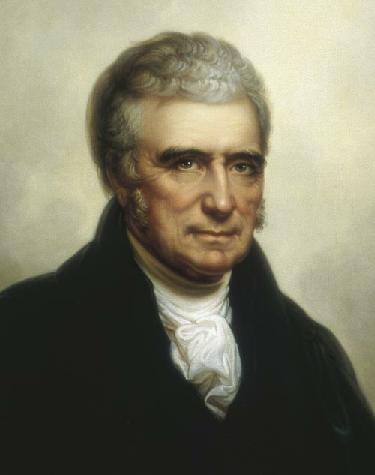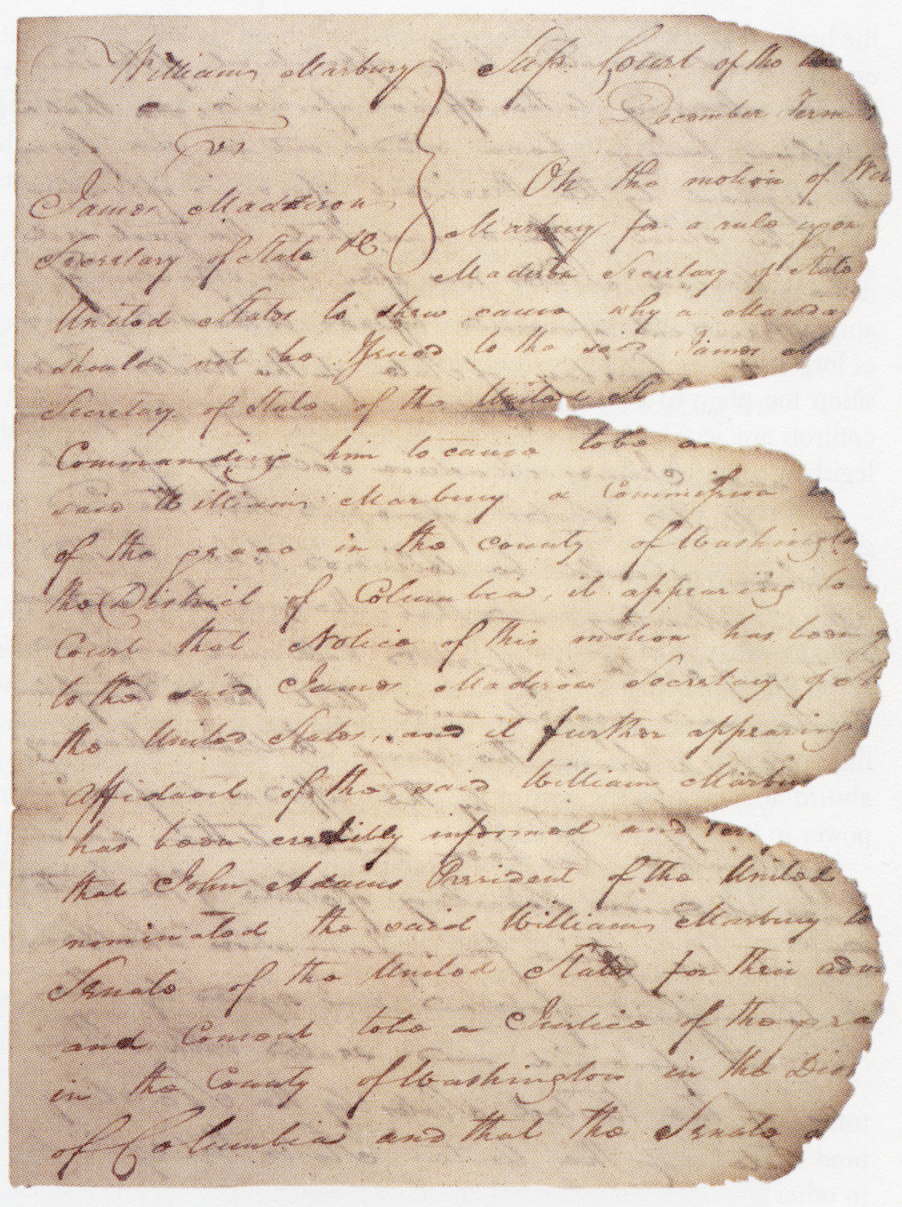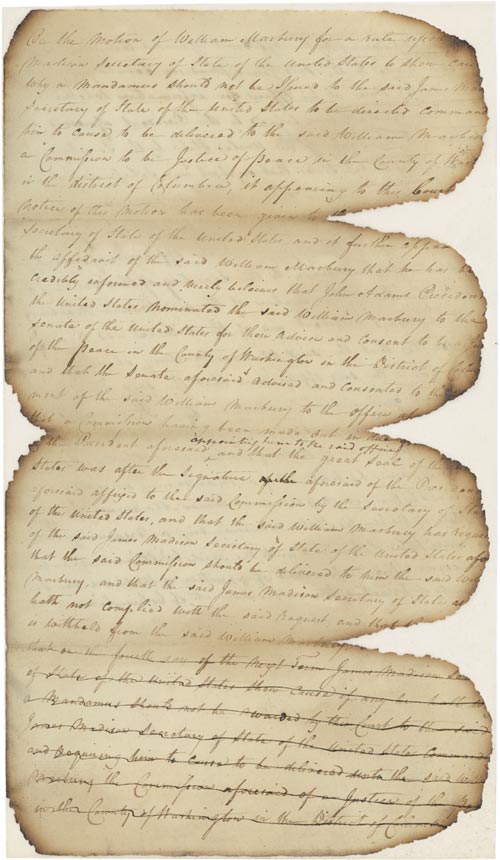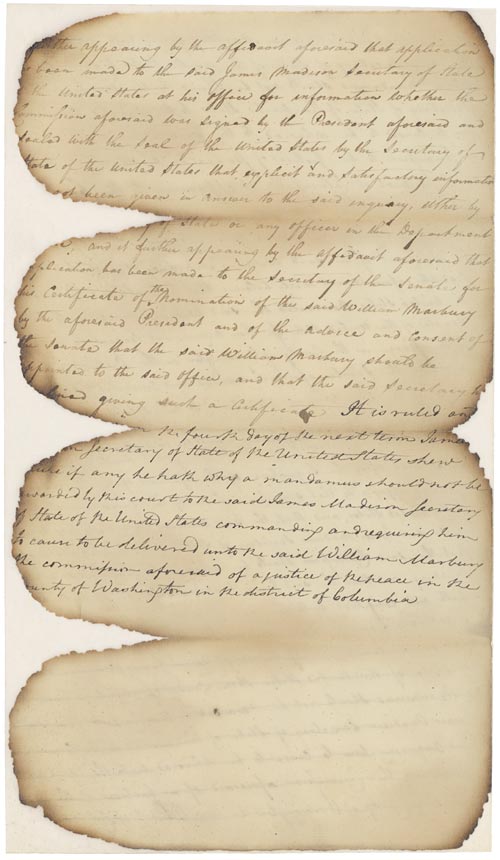Marbury
vs. Madison |

| President Thomas Jefferson and his
Republican Party were deeply suspicious of the Federalist Party's efforts
to fill the federal judiciary with its members. Outgoing Federalist President
John Adams made a series of "midnight appointments" to that effect, among
them William Marbury as a justice of the peace. Adams, however, did
not deliver the actual commission before leaving office, and the new secretary
of state, James Madison, in a move that heightened the partisan wrangling,
refused to deliver it. Marbury then sued to obtain it, asking the
Supreme Court to grant him a "writ of mandamus"—an order from a higher
court commanding that a specified action be taken—to force Madison to turn
over the commission.
"A Law repugnant to the Constitution is void." The Supreme Court chief justice John Marshall argued that Marbury could not get a writ of mandamus because in 1789 the members of Congress had over-stepped their authority when they passed the law that granted the Court the authority to issue such a writ. Significantly, for the first time, the Supreme Court declared unconstitutional a law passed by Congress and signed by the President. The writers of the Constitution had given the executive and legislative branches powers that would limit each other as well as the judiciary branch but had left undefined, within this intricate system, the role of the Supreme Court. It therefore fell to a strong chief justice like John Marshall to complete the triangular structure of checks and balances by establishing the 'principle of judicial review. Although no other law was declared unconstitutional until the Dred Scott decision of 1857, the role of the Supreme Court to invalidate federal and state.laws that are contrary to the Constitution has never been seriously challenged. |

John Marshall - Chief Justice
of the United States Supreme Court
| John Marshall wrote 509 of the 1,100 decisions issued by the Supreme Court during his thirty-four-year tenure as Chief Justice. Associate Justice Joseph Story said of his career, "Your expositions of constitutional law... constitute a monument of fame far beyond the ordinary memorials of political glory. They are destined to enlighten, instruct and convince future generations. ..." |

| CHIEF JUSTICE MARSHALL DELIVERED
THE OPINION OF THE COURT. . . .
The constitution vests the whole judicial power of the United States in one Supreme Court, and such inferior courts as congress shall, from time to time, ordain and establish. This power is expressly extended to all cases arising under the laws of the United States; and, consequently, in some form, may be exercised over the present case; because the right claimed is given by a law of the United States.... In the distribution of this power it is declared that "the Supreme Court shall have original jurisdiction in all cases affecting ambassadors, other public ministers and consuls, and those in which a state shall be a party. In all other cases, the Supreme Court shall have appellate jurisdiction." It has been insisted, at the bar, that as the original grant of jurisdiction, to the supreme and inferior courts, is general, and the clause, assigning original jurisdiction to the Supreme Court, contains no negative or restrictive words, the power remains to the legislature, to assign original jurisdiction to that court in other cases than those specified in the article which has been recited; provided those cases belong to the judicial power of the United States. If it had been intended to leave it in the discretion of the legislature to apportion the judicial power between the supreme and inferior courts according to the will of that body, it would certainly have been useless to have proceeded further than to have defined the judicial power, and the tribunals in which it should be vested. The subsequent part of the section is mere surplusage, is entirely without meaning, if such is to be the construction.... When an instrument organizing fundamentally a judicial system, divides it into one supreme, and so many inferior courts as the legislature may ordain and establish; then enumerates its powers, and proceeds so far to distribute them, as to define the jurisdiction of the supreme court by declaring the cases in which it shall take original jurisdiction, and that in others it shall take appellate jurisdiction; the plain import of the words seems to be, that in one class of cases its jurisdiction is original, and not appellate; in the other it is appellate, and not original. If any other construction would render the clause inoperative, that is an additional reason for rejecting such other construction, and for adhering to their obvious meaning.... The question, whether an act, repugnant to the constitution, can become the law of the land, is a question deeply interesting to the United States; but happily, not of an intricacy proportioned to its interest. It seems only necessary to recognize certain principles, supposed to have been long and well established, to decide it. That the people have an original right to establish, for their future government, such principles as, in their opinion, shall most conduce to their own happiness, is the basis on which the whole American fabric has been erected.... This original and supreme will organizes the government, and assigns to different departments their respective powers. It may either stop here, or establish certain limits not to be transcended by those departments. The government of the United States is of the latter description. The powers of the legislature are defined and limited; and that those limits may not be mistaken, or forgotten, the constitution is written.... It is a proposition too plain to be contested, that the constitution controls any legislative act repugnant to it; or, that the legislature may alter the constitution by an ordinary act. Between these alternatives there is no middle ground. The constitution is either a superior, paramount law, unchangeable by ordinary means, or it is on a level with ordinary legislative acts, and, like other acts, is alterable when the legislature shall please to alter it. If the former part of the alternative be true, then a legislative act contrary to the constitution is not law: if the latter part be true, then written constitutions are absurd attempts, on the part of the people, to limit a power in its own nature illimitable. Certainly all those who have framed written constitutions contemplate them as forming the fundamental and paramount law of the nation, and consequently, the theory of every such government must be, that an act of the legislature, repugnant to the constitution, is void.... If an act of the legislature, repugnant to the constitution, is void, does it, notwithstanding its invalidity, bind the courts, and oblige them to give it effect? Or, in other words, though it be not law, does it constitute a rule as operative as if it was a law? This would be to overthrow in fact what was established in theory; and would seem, at first view, an absurdity too gross to be insisted on. It shall, however, receive a more attentive consideration. It is emphatically the province and duty of the judicial department to say what the law is. Those who apply the rule to particular cases, must of necessity expound and interpret that rule. If two laws conflict with each other, the courts must decide on the operation of each. So if a law be in opposition to the constitution; if both the law and the constitution apply to a particular case, so that the court must either decide that case conformably to the law, disregarding the constitution; or conformably to the constitution, disregarding the law; the court must determine which of these conflicting rules governs the case. This is of the very essence of judicial duty. If, then, the courts are to regard the constitution, and the constitution is superior to any ordinary act of the legislature, the constitution, and not such ordinary act, must govern the case to which they both apply. Those then who controvert the principle that the constitution is to be considered, in court, as a paramount law, are reduced to the necessity of maintaining that the courts must close their eyes on the constitution, and see only the law. This doctrine would subvert the very foundation of all written constitutions.... That it thus reduces to nothing what we have deemed the greatest improvement on political institutions—a written constitution—would of itself be suffi- cient, in America, where written constitutions have been viewed with so much reverence, for rejecting the construction. But the peculiar expressions of the constitution of the United States furnish additional arguments in favour of its rejection. The judicial power of the United States is extended to all cases arising under the constitution. Could it be the intention of those who gave this power, to say that in using it the constitution should not be looked into? That a case arising under the constitution should be decided without examining the instrument under which it arises? This is too extravagant to be maintained.... Thus, the particular phraseology of the constitution of the United States confirms and strengthens the principle, supposed to be essential to all written constitutions, that a law repugnant to the constitution is void; and that courts, as well as other departments, are bound by that instrument. The rule must be discharged. |



